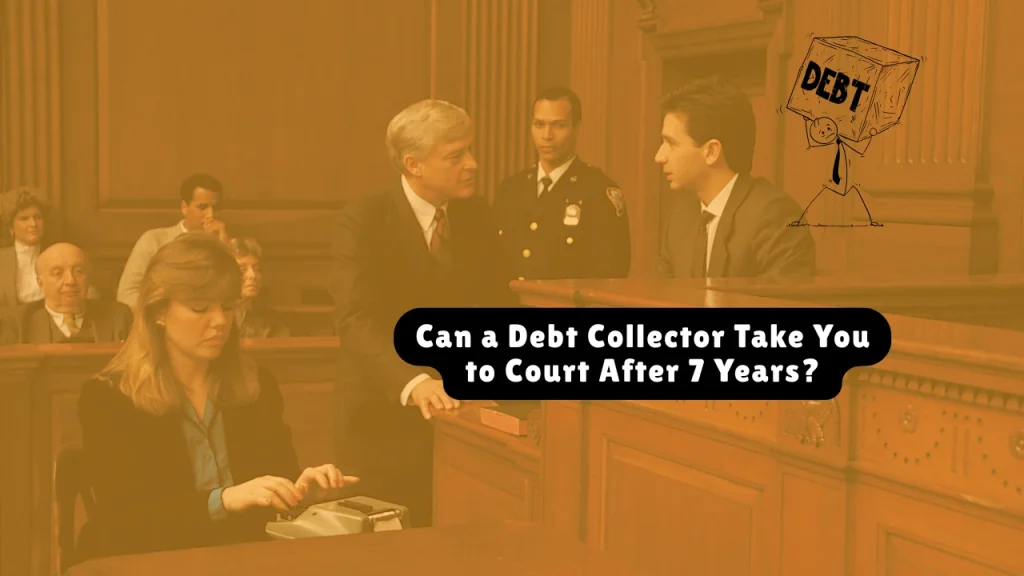Can a Debt Collector Take You to Court After 7 Years?
Yes, debt collectors can sometimes sue you after 7 years, but whether they can successfully do so depends on factors like your state’s statute of limitations (SOL), the type of debt, and actions you’ve taken since the debt was incurred.
Table of Contents
Understanding the Statute of Limitations on Debt
The statute of limitations (SOL) refers to the time period during which a creditor or debt collector can legally take you to court to collect a debt. After the SOL expires, the debt becomes “time-barred,” meaning they cannot sue you for it. However, they can still attempt to collect the debt through calls, letters, and credit reporting.
The length of the SOL varies by state and the type of debt. For example:
- California: Credit card debt has a 4-year SOL.
- Texas: The SOL for credit card debt is 6 years.
- New York: The SOL for open accounts (like credit cards) is 3 years.
The 7-Year Myth: Credit Reporting vs. Legal Liability
While most unpaid debts disappear from credit reports after 7 years under the Fair Credit Reporting Act (FCRA), this doesn’t mean the debt disappears entirely. The FCRA only affects your credit visibility, not your legal liability. Debt can still be enforceable, depending on your state’s SOL and any court judgments already obtained.
Key Points:
- Credit Reporting Limit: Unpaid debts are removed from your credit report after 7 years.
- Legal Enforceability: The SOL determines whether a debt can still be sued. If the SOL has passed, collectors cannot take legal action but can still pursue other means to collect.
When Court Action After 7 Years is Possible
Debt collectors can sue even after 7 years if:
- State Laws Allow Longer SOLs: Some states permit longer SOLs. For example, written contracts in Missouri can be enforced for up to 10 years.
- Judgments Were Previously Obtained: If a creditor sued and won a court judgment, they can enforce it for decades, depending on your state’s rules.
- The Debt Was Revived: Actions like making a partial payment or acknowledging the debt can restart the SOL clock, making the debt enforceable again.
When Court Action is Prohibited After 7 Years
After the SOL has expired and no judgment exists, lawsuits are prohibited. If a debt collector sues, they are violating the Fair Debt Collection Practices Act (FDCPA). However, collectors may still attempt to contact you, even if the debt is time-barred.
Example of Exceptions:
- Texas and New York: In these states, some actions (like making a payment or acknowledging the debt) can “re-age” the debt, making it enforceable again. Always consult a legal professional before making payments on old debts to avoid this.
Can a Debt Collector Re-Age a Debt?
Yes, certain actions can reset the statute of limitations, making a previously time-barred debt legally enforceable. These actions include:
- Making a partial payment.
- Acknowledging the debt verbally or in writing.
- Entering a new repayment agreement.
Be cautious before making any payments or statements that could restart the legal clock on an old debt.
How Debt Collectors Exploit the 7-Year Confusion
Debt collectors may use tactics to exploit the confusion surrounding the 7-year period:
- Zombie Debt: Debt buyers purchase time-barred debts at a fraction of the original amount and try to collect them using tactics like phantom settlements.
- Legal Bluffing: Debt collectors may threaten lawsuits on expired debts, hoping consumers won’t fight back.
Protecting Yourself from Debt Collection After 7 Years
To protect yourself from aggressive debt collection tactics, here’s what you should do:
- Know Your Rights: Understand the statute of limitations for your debt and state.
- Respond to Lawsuits: If you’re sued for an expired debt, attend the court hearing and use the SOL defense.
- Avoid Re-Aging the Debt: Never make payments or acknowledge old debts without first consulting a legal professional.
- Seek Legal Advice: If in doubt, consult with a consumer rights attorney.

What Happens If You Ignore a Lawsuit for a Time-Barred Debt?
Ignoring a lawsuit for a time-barred debt can be risky. If you don’t respond to the court summons, the court might issue a default judgment against you, which could lead to wage garnishment or bank account levies. Always attend court hearings and raise the statute of limitations defense if applicable.
Long-Term Solutions for Expired Debts
If you’re dealing with expired debts, here are some options:
- Bankruptcy: Bankruptcy can eliminate judgments and unsecured debts, including time-barred debts (Chapter 7 or Chapter 13).
- Settlement Negotiations: You can negotiate a settlement for 20–40% of the debt in writing, clearly stating that the payment does not revive the SOL.
- Statutory Forgiveness: Some states automatically void judgments after 10 years if they have not been enforced.
Conclusion
While the 7-year period can seem like a hard cutoff, it is crucial to remember that legal liability is separate from credit reporting. Understanding your state’s statute of limitations and knowing your rights is key to protecting yourself from unwarranted legal actions. Always consult with an attorney if you’re unsure about your situation or have been contacted about a time-barred debt.
About the Author

Sarah Klein, JD, is a former consumer rights attorney who spent years helping clients with issues like unfair billing, product disputes, and debt collection practices. At All About Lawyer, she simplifies consumer protection laws so readers can defend their rights and resolve problems with confidence.
Read more about Sarah
